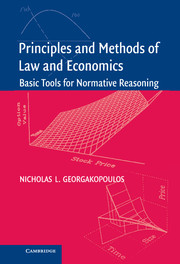Book contents
- Frontmatter
- Contents
- Preface
- INTRODUCTION: INNOVATION IN LEGAL THINKING
- PART 1 PRINCIPLES
- PART 2 METHODS
- 7 MATHEMATICAL MODELING
- 8 CONFRONTING UNCERTAINTY: BASIC PROBABILITY THEORY
- 9 ADVANCED PROBABILITY: DISTRIBUTIONS AS THE SHAPE OF RANDOMNESS
- 10 HOW TO PRICE UNCERTAINTY: FINANCE
- 11 FINANCE AND PROBABILITY: OPTIONS AND DERIVATIVES
- 12 USING SPREADSHEETS
- 13 STATISTICS
- 14 CONCLUSION: IMPORTING METHODOLOGICAL INNOVATIONS
- APPENDIX A MEINHARD V. SALMON 249 N.Y. 458 (1928)
- APPENDIX B GLOSSARY
- APPENDIX C MATHEMATICA NOTEBOOKS
- Index
10 - HOW TO PRICE UNCERTAINTY: FINANCE
Published online by Cambridge University Press: 24 July 2009
- Frontmatter
- Contents
- Preface
- INTRODUCTION: INNOVATION IN LEGAL THINKING
- PART 1 PRINCIPLES
- PART 2 METHODS
- 7 MATHEMATICAL MODELING
- 8 CONFRONTING UNCERTAINTY: BASIC PROBABILITY THEORY
- 9 ADVANCED PROBABILITY: DISTRIBUTIONS AS THE SHAPE OF RANDOMNESS
- 10 HOW TO PRICE UNCERTAINTY: FINANCE
- 11 FINANCE AND PROBABILITY: OPTIONS AND DERIVATIVES
- 12 USING SPREADSHEETS
- 13 STATISTICS
- 14 CONCLUSION: IMPORTING METHODOLOGICAL INNOVATIONS
- APPENDIX A MEINHARD V. SALMON 249 N.Y. 458 (1928)
- APPENDIX B GLOSSARY
- APPENDIX C MATHEMATICA NOTEBOOKS
- Index
Summary
Much of law is about financial arrangements. This may be an understatement because all of private, and much of public, law rests on the idea that certain wrongs (torts, breaches, etc.) trigger financial compensation. Not all payments of a given amount are equal, however, because time and risk matter. This chapter explains how the value of a payment changes with time – what is called discounting or the time value of money – and how to adjust for the risk of future payments from businesses according to the Capital Asset Pricing Model. Legal analysis needs a sound understanding of these topics.
The importance of financial knowledge is starkly visible in Meinhard v. Salmon because it involves an overtly financial relation. Salmon received a lucrative offer from Gerry, a business acquaintance. The offer could have expanded Salmon's business. Unbeknownst to Gerry, Salmon's business, which was the reason for their acquaintance, had a secret partner, Meinhard. If Gerry knew that Salmon operated in two capacities, as an individual and as a member of a partnership, then Gerry may have specified which of the two he selected as the recipient of his offer. Meinhard, the invisible partner, claimed the offer should be treated as made to the partnership. The case involved numerous payments at different points in time, illustrating the importance of discounting and valuation. The case is also an excellent example of the practical importance of valuation.
- Type
- Chapter
- Information
- Principles and Methods of Law and EconomicsEnhancing Normative Analysis, pp. 197 - 224Publisher: Cambridge University PressPrint publication year: 2005



